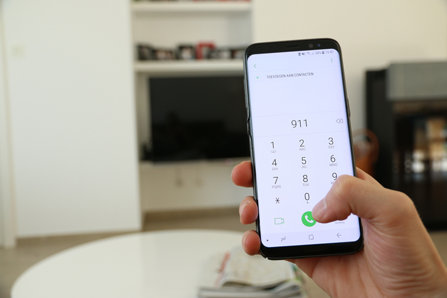Should I Call the Cops on My Addicted Son or Daughter?

This is a difficult question that the parents of addicts sometimes have to ask. “Should I call the cops on my addicted son or daughter?” In the following paragraphs, we’ll look at some of the pros and cons of doing so. We’ll look at the support for calling the cops. And we’ll look at the reasonings for why some parents refuse to do this.
No matter what, having a son or daughter who struggles with a drug problem is a challenge and a hardship. There’s no getting around that. So how can parents know if they should, under pressing circumstances, call the police on their son or daughter?
What Does Calling the Police Entail?
When a parent has an adult child who is using drugs or drinking to excess, such a habit brings with it endless unpleasantness. Destructive behavior, angry outbursts, physical and emotional abuse, damage to property, stolen possessions, the threat of harm, even actual bodily injury to the parents or other family members.
And that’s just the beginning.
There’s also the threat of harm that an addict poses to himself. While under the influence of drugs, an addicted son or daughter might get into a car accident, might get into a fight, might get into trouble or danger with other addicts or drug dealers, might fall or hurt themselves in some other way, etc.
An addict puts himself at risk every day, and he puts the lives of those around him at risk every day, too.
But calling the cops is a very serious step that is hard to take back once you have made the call. It entails entering the addict into the criminal justice system, which itself is highly flawed, and starting a criminal record for the addict, something that will follow him for the rest of his life.
Calling the police means asking for criminal justice intervention. It is a way to use the long arm of the law to prevent an addict from continuing on his destructive path.
Some would say it is the right thing to do. The less informed argue that calling the cops on an addict is the only way to get him to stop. Others would say that the long-term damage of time spent in jail plus a permanent criminal record is going to have harmful repercussions. In almost all cases, unless the addict is putting himself or others in danger, calling the police might make the situation worse in the long-run. However the worst thing one can do is nothing, or to allow the addict to continue criminal behavior such as stealing. Just remember, once you call the police it will likely be out of your hands and you will not be able to withdraw charges at a later time. Never use the police in an attempt to "scare" the addict. Police intervention is a serious situation and the situation can quickly become dangerous if the addict chooses not to comply.
Exploring Personal Testimony

Parents have taken to the internet to write about their experiences. They’ve spoken about the hardships of being a parent to an adult son or daughter who struggles with a substance abuse habit. There is value in reading their testimonies. It’s not that each testimony will be identical or relatable to our own present circumstances. However, we might learn something from how other parents coped with similar struggles of their own.
In an article from Today, the story is told of one mother who called the cops on her son. She did so not to get him into trouble, but because her son was living on the streets and she feared he might die soon. A jail cell is a terrible place for an addict to be. But in this case and for this mother, she felt it was a better place for her son than the grave she thought he was nearing.
Another article in U.S. News explored that same story. But this article also cited commentary from leading experts. Each expert strongly encouraged parents to try and get their kids into residential drug treatment centers. But failing that, the experts said jail is sometimes the best (and only) option.
Another article in Very Well Mind speaks to an audience of grandparents. This article goes over the problematic situation of senior citizens with adult children who use drugs. And to make matters worse, those adult children often have kids of their own. What does a parent/grandparent do in those circumstances? In such a situation, grandparents have to think about the safety and wellbeing of their kids and their grandkids.
Sending a son or daughter to jail might seem like the right idea, but then what will happen to the children of the addict? Will the parents lose custody? Will the grandparents be able to provide childcare? There are multiple factors to consider.
An article in The Star reported on the antagonism and hatred that is directed at parents for calling the cops on their kids. That article features three stories of parents who, under much duress, decided to call the police on their child. The report shows the immense criticism and strife that was given back to those parents for their actions. But it also shows the parents’ side and the logic behind why they did what they did.
Treatment is the Best Answer
It’s impossible to make a stand and say that calling the cops on an addicted son or daughter is “right” or “wrong.” The issue is not that black and white. Instead, it is an issue that should be assessed very carefully and on a case-by-case basis. Parents might consider only calling the police on their son or daughter when a life is in danger. And the truth is, only the parents, at that moment, can make that decision. It’s not for me to say whether calling the police is the right thing to do or the wrong thing to do.
The most important thing to remember is the need to get an addicted son or daughter into a drug and alcohol treatment program. Sometimes, police departments help with that sort of thing. They are few and far between, but the trend of law enforcement diversion is catching on. The LEAD program in King County, Washington, is a good example. Such programs allow the police to direct addicts into treatment centers, not jail cells.
Addiction treatment of a residential nature is what will ultimately help an addict break free from his vicious, life-threatening crisis. Residential treatment should always be the end-goal, the mission, and the objective that any parent is pushing for.
Sources:
- https://community.today.com/parentingteam/post/a-mothers-struggle-to-call-the-police-on-her-opioid-addicted-kid
- https://health.usnews.com/wellness/family/articles/2017-01-30/should-parents-call-the-police-on-their-opioid-addicted-kids
- https://www.verywellmind.com/grandchild-lives-with-substance-abuser-4065660
- https://www.thestar.com/life/2015/03/06/what-kind-of-parent-calls-the-police-on-their-child.html
- http://leadkingcounty.org/
 ®
®